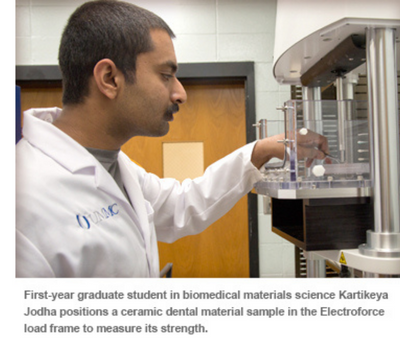Making Mississippi Healthier Through Research
Good morning!
Today I want to return to something I brought up a few weeks ago - the idea that sometimes, amid all the distractions we face in the complex world of an academic health sciences center, it's important to remember what our core missions are and why they're so important in achieving our goals.
Today I want to focus on our research mission.
But first, a brief story.
Legend has it that President Lyndon Johnson, during a tour of NASA headquarters in Houston, paused to ask a woman sweeping the floor what her job was.
“I'm putting a man on the moon, Mr. President,” she said.
That clearly articulated goal, both audacious and noble, forged a unity among NASA employees at every level, from astronauts to computer analysts to cafeteria workers. It's a reminder of how powerful and motivating a big goal can be.
 Making Mississippi healthier, with all the forces working against that audacious and noble goal, may be just as daunting and seemingly impossible as reaching the moon was in the early 1960s.
Making Mississippi healthier, with all the forces working against that audacious and noble goal, may be just as daunting and seemingly impossible as reaching the moon was in the early 1960s.
But at least one thing is clear: We won't get there without research and innovation. The challenges of obesity, cancer and cardiovascular disease, of Alzheimer's, of prematurity and a hundred other scourges, will only give way when we develop and implement new and better methods to prevent, treat or cure.
That's why I'm so encouraged by all the good things I see happening in the UMMC research mission today.
Just a few recent highlights:
- We are about to celebrate 30 years of participation in the ARIC study - a national investigation of risk factors for cardiovascular disease. Data from this study have yielded a treasure trove of insights. The offshoot ARIC Neurocognitive Study is in its second round of funding and is one of our largest research initiatives.
- We've completed the transition to new leadership in the Jackson Heart Study, positioning it for unprecedented levels of productivity from our own researchers and many others throughout the world.
- Our Department of Pharmacology and Toxicology in the School of Medicine has received notice of renewed funding on several important grants and two new R01 grants, the gold standard of funding for principal investigators.
- Our School of Population Health is poised to contribute mightily to our future research efforts, opening broad new avenues of study of the social determinants of health. (We'll share more news about this next week.)
These kinds of developments don't happen by accident. They represent years of hard work and significant investment of resources.
They are also the result of careful planning. With that in mind, I asked Dr. Richard Summers, associate vice chancellor for research, to share his top five goals for the research mission. Here they are:
Better integration of the research mission with the clinical and education missions. This can be accomplished by making the processes of research relevant to the other mission areas. The vehicle for this integration is the new “precision medicine” that relies on discovering each individual's unique biology. In this modern way of practice, every patient is essentially considered as a research subject. Educating our students and residents in this modern approach to medicine will also be important.
Development of a robust clinical research and trials infrastructure. Includes completing the clinical research unit in University Hospital, centralizing clinical trial coordination to support the clinical researcher in a plug-and-play process, streamlining the approval process for doing clinical research, and marketing our clinical research and trials capacity to industry and the general public.
Building a research infrastructure that is confluent with the Mayo Clinic. Includes building a shared IT platform for clinical research and mirroring the processes of our biobank and other areas of research. This will allow us to combine our resources and perform shared clinical trials.
Developing a statewide data warehouse for doing population research. Includes a partnership with the Mississippi Health Information Network and the Department of Health to collect data from hospitals and clinics throughout the state to inform systems of care for the Mississippi population.
Doubling funding for UMMC research during the next five years. While we will continue to seek funding from traditional sources such as the National Institutes of Health, the National Science Foundation and the American Heart Association, we will broaden our scope by looking for financing from industry, foundations and other federal sources, such as the U.S. Department of Agriculture, the Health Resources and Services Administration and the Department of Defense.
I think these are a strong top five, and there are other initiatives in the works related to technology transfer, industry partnerships and developing a Center for Innovation.
One thing that is definitely in our favor is that the American public has recognized the value of research aimed at finding cures and improving human health. I know that members of our Congressional delegation have been staunch supporters of medical research and of UMMC in particular, and they proved that this week by passing a spending bill that increased NIH funding for research by $2 billion. I'm grateful for their support.
I'll close by citing the words of another president, John F. Kennedy, when he announced in 1962 that Americans would go to the moon by the end of the decade. Said JFK: “We choose to go to the moon and do the other things, not because they are easy, but because they are hard….”
Making Mississippi healthier is hard. But it's also our moonshot. Our big, audacious goal. And UMMC research is an indispensable tool in getting us there.



